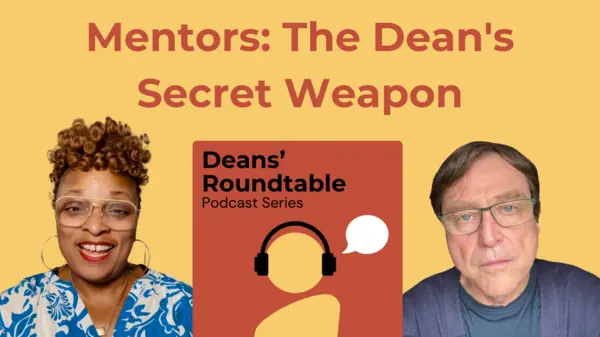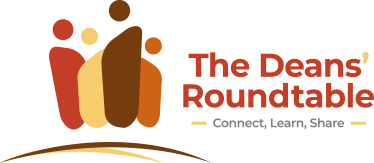Mentorship in Educational Leadership: What Makes a Great Dean
Reconnecting with a Mentor: My Conversation with David Torcoletti
When certain people enter your life, they leave an imprint that shapes your trajectory in ways you couldn’t have imagined. For me, David Torcoletti is one of those pivotal figures. After an incredible 18-year gap, I had the privilege of reconnecting with the man whose guidance fundamentally shaped my approach to leadership and education.
There’s something powerful about circling back to those who influenced your formative professional years. As I prepared to welcome David as a guest on my podcast, I couldn’t help but reflect on how his mentorship planted the seeds for initiatives like the Deans’ Roundtable—a program that has since grown beyond what either of us could have envisioned nearly two decades ago.
David’s thoughtful approach to coaching administrators didn’t just teach me techniques; it helped me develop a philosophy that has guided my entire career as a dean. Our recent conversation on mentorship reminded me why his influence has remained so enduring in my professional life.
I’m profoundly grateful for David’s willingness to share his wisdom once again, this time with my audience. This full-circle moment represents everything I believe about the lasting impact of meaningful mentorship in educational leadership.

Finding Your Path in Educational Leadership
David shared how his journey began with a simple desire to teach photography to high school students. What started as a part-time teaching position evolved when he was offered dormitory housing.
“I’m living on a floor with 25 boys in North Crosley dormitory. And I’m sitting there with them and they are living their lives and their lives are so full and thick. And they’re just trying to figure out life and I’m there and they’re knocking on my door and I need to figure out life too. And that’s kind of what hooked me,” David explained.
This experience of connecting with students in their daily lives drew him toward leadership roles. He moved from teaching to running a dormitory, then to becoming a dean, driven by a desire to shape policies and influence how the community lived together.
The Art of Educational Leadership
Coming from an arts background, David brings a unique perspective to educational leadership. He believes the artistic mindset – focusing on questions rather than answers – shapes his approach to working with students and faculty.
“In the arts, when you’re an artist and you’re pursuing that thing, the weight is on the question rather than on the answer. The answer is a process,” David noted. This questioning approach helps him navigate community challenges and develop thoughtful policies.
The Evolution of a Dean
When I asked about his evolution as a dean, David acknowledged that while his core nature remained consistent, his perspective broadened over time:
“My perspective got longer and better. And I think I held my tone more,” he shared.
One critical lesson he learned: “You don’t have the story. You don’t know the story yet.” Where young deans might rush to judgment, experience taught him to take a breath and recognize that situations are usually more complex than they first appear.
The Mentor-Mentee Relationship
As someone who benefited tremendously from David’s mentorship when I stepped into my first dean role, I can attest to the value of having someone who can help you:
- Get the full story before making decisions
- Trust your gut instincts
- Develop your voice as a leader
- Understand your triggers and blind spots
David approaches mentoring by helping educational leaders understand their values and shadows – the hidden aspects of ourselves that can unconsciously drive our reactions.
“We teach out of our nature. We teach out of our values,” he explained. Understanding what triggers your emotional reactions helps prevent overreaction and allows for more thoughtful leadership.
What Makes a Good Dean?
Not everyone is suited for dean work. According to David, effective deans need:
- Perspective – The ability to see the big picture beyond day-to-day drama
- A sense of justice – Being bothered when people are treated unfairly
- Commitment to shared standards – Treating handbooks and community agreements as living documents
- Detachment – Not being so attached to specific outcomes that you can’t see other possibilities
- Thick skin – Not letting others’ disappointment manipulate your decisions
Perhaps most challenging for many leaders is balancing the supportive and accountability aspects of the role. David observed that modern educational leaders often prefer the supportive side:
“I think now that second part, the holding accountable, making certain that people do what it is they said they were supposed to do or what the school needs from them…is held in a different way right now.”
The Value of Restorative Practices
Our conversation touched on the value of restorative practices in educational settings. While traditional approaches focused heavily on consequences, restorative practices emphasize repairing harm and rebuilding relationships.
“I like the idea that we should be really thoughtful about how it is that somebody contributes to repairing the relationship, the community, whatever it is that was harmed by their actions,” David reflected.
We both agreed it’s not about avoiding consequences but creating meaningful learning through a both/and approach. Restorative practices work best when they include both accountability and community restoration.
Mentorship at Any Stage
One powerful insight: mentorship isn’t just for beginners. David shared a story about a school head who sought coaching in his 60s, demonstrating that guidance is valuable at all career stages.
“Late career people in some ways need it more because they can more easily fall into a world that’s fossilized,” David noted. Mentorship helps leaders adapt as education evolves.
The Mentor’s Legacy
When asked about his legacy as a mentor, David’s answer was beautifully simple:
“If I had any legacy, small l, for working with other people, it would be simply that it sets up an expectation that they owe somebody else that too.”
This ripple effect – where those who are mentored go on to mentor others – creates a community of care and continuous learning among educational leaders.
Final Advice for Deans
David’s parting advice focused not on work but on life balance:
“Make sure you live your life. Like make sure you know what matters to you.”
He reminded listeners that maintaining passions outside of work – whether exercise, music, reading, or spending time with friends – helps keep the demanding role of dean in proper perspective.
“When you live your life, this work, which seems all-encompassing, will find its proper level in your life, which is that it’s important, but it’s not everything.”
If you want to hear the whole conversation with David Torcoletti, listen to the full episode of the Dean’s Roundtable podcast. And mark your calendars – David will be speaking at the Dean’s Roundtable annual conference this summer, June 23-26, at New England Innovation Academy. Join us to learn from exceptional educational leaders like David!
Bridget Johnson
Discover the new Deans’ Roundtable Student Life Assessment Tool
(Accepting Founding Schools for a limited time only)
Want more support as a student life professional?
Look no further than the Deans' Roundtable Community
- Network with a vast directory of student life professionals like yourself
- Gain a multitude of professional development opportunities to be the best version of yourself
- Gather expert advice on the important questions you need answered

